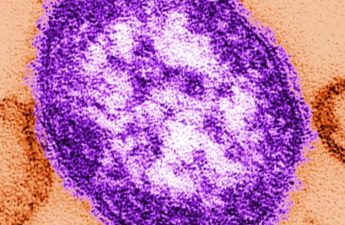
By: Jenni Bergal, Stateline
Like millions of older adults across the country, Allan Potter and his wife, Vicki, are eager to get the COVID-19 vaccine.
The Potters, who live in Stevens Point, Wisconsin, are prime candidates. They’re both 73. He suffers from a neuromuscular disorder. She has multiple myeloma. They hoped to sign up for the shots and get them quickly.
But they don’t have a computer or a smartphone. And, as in many states and counties, that’s a problem because most of the registration and appointment-setting is being done online.
“Not all of us have a computer or are on the internet,” Allan Potter said. “We’re old-school. We’ve got a landline and that’s it. It’s very frustrating.”
While many older adults have access to the internet and are tech-savvy, others are not. And even some of those who are used to going online are having a hard time navigating complicated registration websites. Others who are being left out include low-income residents who may not have the technology and people in rural areas with poor internet connections.
Many older people are turning to adult children, other family members or friends to help them. Others are just left out.
“People are so frustrated because nobody is taking the time to explain how the system is working,” said Cindy Piotrowski, director of the Aging & Disability Resource Center of Portage County in Wisconsin. “The ageism and the societal disrespect for people who are aging is more pronounced now than ever before.”
Some states have set up websites where residents can register to get vaccines. So have county health departments, hospitals, pharmacies and grocery stores. But the websites typically require email addresses or a cellphone that can receive text messages. That doesn’t help older adults like the Potters, who have neither.
“The irony is that the people who most need quick access to the vaccine may be those who are least likely to have internet skills or access to make an online appointment,” said Susan Nash, a consulting research scholar at the Stanford Center on Longevity, a research center at the university.STATELINE STORY February 1, 2021Without a Ride, Many in Need Have No Shot at COVID-19 Vaccine
Some states and counties have launched telephone hotlines that residents can call to register, and in some cases, get appointments. But for now, most require online signups.
Tammy Taylor-Bufford, a cardiology nurse practitioner in Clarksdale, Mississippi, knows that means a lot of people are being missed, including some of her patients.
“The majority of the patients in our clinic are African American. Many of these older people don’t have computers or smartphones,” she said. “Those are the kind of people who get left behind, left out.”
Taylor-Bufford decided to take it upon herself to help them. So far, she has registered about 18 patients for vaccines online, sometimes using her email address for confirmation. She searches the state’s website for any appointments that might pop up locally and tries to grab them.
Even some of her patients who use the internet need her help, Taylor-Bufford found, because they were confused or put off by the online registration process.
Arthur Allen, 75, of Courtland, Mississippi, was one of them. He has a smartphone, which he tried to use to register online for a vaccine.
“Once I finally got on the website, it told me the wait time was something like 120 minutes. I said, no, I can’t do that,” Allen said. “I’m not as good on the technology as my grandkids, and this was such a hassle.”
Allen turned to Taylor-Bufford, who registered him and his wife, Ever. They got their first shot Feb. 1.
“When they pushed out this thing, they were thinking about the younger folks. But what about the older folks who don’t have that technology, like some of the ones at my church?” Allen said. “And I live in a rural area, where many people who do have computers can’t even get good internet service.”
Digital Divide
The digital divide between older and younger people isn’t new, but the pandemic has made that gap clearer than ever. Older adults who don’t use technology couldn’t get emails or video-chat with their grandchildren. They couldn’t search online for COVID-19 testing sites.
And now, when the vaccine has become available to people their age—who are at higher risk of contracting the virus—many can’t figure out how to access it.
A 2017 Pew Research Center report found that while 82% of people aged 65 to 69 were internet users, just 44% of those aged 80 and up were, and only 28% of those residents had broadband service. (The Pew Charitable Trusts funds the research center and Stateline.)
Just 17% of those aged 80 and older owned smartphones.
“The last 10 months without internet access have been very hard for those people,” said the Stanford institute’s Nash.
And for older people who do use technology, Nash said, there’s a second digital divide between those who are completely competent using it and those who have only basic skills and find it difficult to figure out something new.
“The irony is that the people who most need quick access to the vaccine may be those who are least likely to have internet skills or access to make an online appointment.”
Susan Nash, consulting research scholar at the Stanford Center on Longevity
Lucille Koschmann, 96, said she can receive and send email on her computer, but that’s about it. Her adult children have been trying to help sign her up online for a vaccine appointment but have had no luck.
“It’s difficult with a capital D,” said Koschmann, a retired teacher in Stevens Point, Wisconsin. “My family is very concerned. They’ve tried and they haven’t gotten any kind of answer that satisfies.”
Koschmann turned to her local senior center. A staffer ultimately got her placed on a waiting list for an appointment at a local hospital.
“I called the hospital to see if I could come. They said, ‘No, we’ll call you when you can come.’ But they are out of vaccine and are waiting for it,” Koschmann said. “It’s very draining. What more are we supposed to do?”
State Sites
In some states, such as Wisconsin, where Koschmann lives, there is no statewide online vaccine registration site. Medical systems, pharmacies and public health departments each are doing their own registrations.
Other states have created online registration sites. Some also have set up phone lines, though residents still need to go online to book appointments for vaccines.
But some states, such as Indiana and Vermont, have phone lines that older adults without technology can dial to set up appointments.
The Vermont Department of Health has scheduled nearly 12,000 of its 26,500 appointments for residents aged 75 and up through a state phone call-in system, according to spokesperson Katie Warchut. It’s now getting about 800 calls a day, and the average hold time is about one and a half minutes, she said.STATELINE STORY January 8, 2021‘No One Knew the Plan’: States Struggle to Increase Vaccinations
In Minnesota, residents 65 and older who only have a landline and registered through a call center late last month will get a call if they are randomly selected for an appointment from a vaccination registry, according to Jesse Stock, a state Department of Health spokesperson.
And in Connecticut, state health officials turned to the United Way of Connecticut, which already operates its 211 information system. The organization set up a toll-free vaccine appointment assistance line for those who don’t have access to technology or aren’t fluent in using it.
Hospitals, health departments and federally qualified health centers allot a certain number of vaccine appointment slots for residents who use the phone registration system, said Lisa Tepper Bates, the group’s president and CEO.
So far, the United Way has scheduled about 16,250 call-in patients for vaccines, according to Tepper Bates.
When the phone registration started in mid-January, staffers could only book appointments at a drive-thru mass vaccination site near Hartford, which was a problem for those who lived far away.
“The biggest challenge was the fact that when it was announced, we had a gigantic typhoon of calls. That’s hard for any call center to manage,” she said. “We have a call-back option if we can’t get to them pretty quickly, and we had a big queue of people who wanted to be called back.”
But the organization has continued to add locations, Tepper Bates said, and starting this week should be able to make about 10,000 appointments a week at nearly a dozen sites. While the center had been able to answer calls within three minutes of hold time, that changed after the state recently announced it was expanding eligibility to those ages 65 through 74.
The call center is being inundated and hold times are “very long,” Tepper Bates said, noting that callers still can opt for a callback. United Way is doubling its call center staff of 125 to manage the added demand.
“This is already a time when so many of them are stressed and feeling anxious,” she said. “They’re incredibly grateful that they’re getting a human being on the phone who can help them get an appointment.”
Local Help
Some local governments also are trying to reach out to those who don’t—or can’t—use the internet.
In Bucks County, Pennsylvania, residents without smartphones or online access can phone a call center and pre-register. The call center sends their information to the local health department, which will call them when an appointment opens, said county spokesperson Larry King.
The county launched the call center last month, and about 100 people a day are pre-registering, he said.
In St. Lawrence County, New York, workers at the Office for the Aging are using their own cellphone numbers and county emails to register older adults. Staffers then mail or deliver appointment information and forms to them in person.STATELINE STORY February 2, 2021These States Found the Secret to COVID-19 Vaccination Success
In Knox County, Tennessee, the health department reserved about 400 appointments for people who called an information line because they didn’t have internet access, according to spokesperson Kelsey Wilson. The county will continue offering a dial-in option for registration and appointments.
In Greenburgh, New York, a suburban area outside of New York City, town officials have created a volunteer network called the Greenburgh Covid Angels to help older adults register for vaccines online. Town Supervisor Paul Feiner said many older adults had contacted him and were confused about the process, so he put out the call for volunteers. About 180 have signed up.
“When people try calling the New York state hotline to get help, they can’t get through,” Feiner said. “It’s very frustrating for seniors. One person told me that they thought they’d get a heart attack just trying.”
The idea behind the network, Feiner said, is not just to register older adults but also to let them know that they’re not alone, that someone is there to help them.
“These people are really worried,” he said. “They feel if they don’t get the vaccine they may not live.”
At the center on aging in Portage County, Wisconsin, Piotrowski said three staffers on each shift take calls from older adults without internet access and help register them for vaccines online.
Between a third and 40% of older adults in Wisconsin do not use the internet, she said. Many are calling various locations that are administering shots and being told they need to go online to register.
So far, the center has registered 44 people, including the Potters and Lucille Koschmann, though none have gotten appointments yet, Piotrowski said.
“The vast majority of providers out there, the hospital systems, the clinics, are trying to do all this online. It was a case of doing what was expedient,” she said. “They are failing seniors. They don’t seem to understand that their means of communication is a telephone.”


